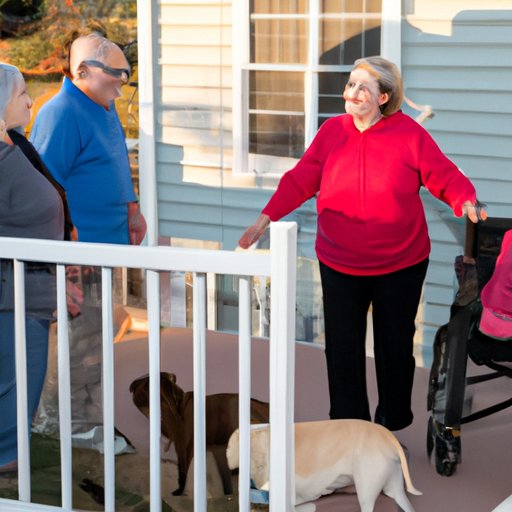
Introduction
As we age, there may come a time when we need long-term care assistance in a nursing home. However, many seniors and their families worry about the cost of nursing home care. What happens if you have no money to pay for nursing home care? In this article, we will explore government programs and long-term care options available to seniors with little to no financial means.
Navigating the Complexities of Medicaid: How to Cover Nursing Home Costs When You’re Broke
Medicaid is a government-funded program that can help cover nursing home costs for low-income seniors. In order to be eligible for Medicaid, you must meet certain income and asset requirements. In most states, the income limit is around $2,349 per month, and you must have less than $2,000 in assets, not including your home and car.
To apply for Medicaid assistance, you will need to fill out an application with your local Medicaid office. The application process can be lengthy, so it’s important to start as soon as possible. Once your application is submitted, it can take several weeks to several months to receive approval.
When the Bank Account is Empty: Who Foots the Bill for Nursing Home Care?
Family members of nursing home residents may be responsible for paying for nursing home costs if the resident cannot afford it. This is known as “filial responsibility,” and it varies by state. Some states have filial responsibility laws on the books that require adult children to help pay for their parents’ nursing home costs.
When determining a senior’s ability to pay for nursing home care, their income and assets are taken into consideration. Medicaid will also often require that any income the resident receives, such as Social Security, be put towards the nursing home expenses.
While nursing homes cannot legally evict residents who can’t afford to pay, they may be able to discharge them if they determine that the senior no longer needs skilled nursing care and can be cared for through other means, such as home care or assisted living.
Breaking Down Long-Term Care Options for Seniors Without Financial Means
There are a few different long-term care options available for seniors who cannot afford traditional nursing home care. Assisted living facilities offer less intensive care than nursing homes and may be less expensive. Adult foster care is another option, where seniors live in a private home with a caregiver who provides hands-on care. However, adult foster care is typically not covered by Medicaid.
It’s important to weigh the pros and cons of each option, as well as the cost. Another alternative to traditional long-term care is in-home care. This option allows seniors to remain in their own home while receiving care from a home health aide or nurse. Of course, this option is not always feasible depending on the senior’s medical needs and the availability of support from family and friends.
No Money, No Problem: Understanding Your Rights as a Nursing Home Resident
All nursing home residents, regardless of their financial situation, have rights. These rights include the right to quality care, the right to privacy, the right to participate in activities, and more. If your rights as a nursing home resident are being violated, you have the right to file a complaint with your state’s long-term care ombudsman.
If you are a low-income nursing home resident, there are agencies that can offer additional support. Your state’s Medicaid office may be able to provide assistance with filing complaints and accessing additional resources.
Caring for America’s Most Vulnerable: How Government Programs Help Cover Nursing Home Costs for the Elderly and Impoverished
There are several government programs that can provide assistance with nursing home costs, including Medicaid, Veterans Affairs (VA) benefits, and Medicare. Medicaid is the largest provider of nursing home care in the US, and they cover around two-thirds of all nursing home residents.
Veterans and their spouses may be eligible for VA benefits to help with nursing home costs. Medicare also covers some costs associated with short-term nursing home care after a hospital stay, but they do not cover long-term nursing home care.
Conclusion
When it comes to nursing home care for seniors with no money, there are government programs and long-term care options available. Medicaid is often the best option for those who meet the income and asset requirements. However, other options such as assisted living facilities and in-home care may be more affordable for some seniors.
It’s important for seniors and their families to understand their rights as nursing home residents, and to seek help and support if they are unable to afford long-term care. With resources and assistance available, no senior should have to go without necessary care.





